Guibin Chen
SkyReels-V3 Technique Report
Jan 24, 2026Abstract:Video generation serves as a cornerstone for building world models, where multimodal contextual inference stands as the defining test of capability. In this end, we present SkyReels-V3, a conditional video generation model, built upon a unified multimodal in-context learning framework with diffusion Transformers. SkyReels-V3 model supports three core generative paradigms within a single architecture: reference images-to-video synthesis, video-to-video extension and audio-guided video generation. (i) reference images-to-video model is designed to produce high-fidelity videos with strong subject identity preservation, temporal coherence, and narrative consistency. To enhance reference adherence and compositional stability, we design a comprehensive data processing pipeline that leverages cross frame pairing, image editing, and semantic rewriting, effectively mitigating copy paste artifacts. During training, an image video hybrid strategy combined with multi-resolution joint optimization is employed to improve generalization and robustness across diverse scenarios. (ii) video extension model integrates spatio-temporal consistency modeling with large-scale video understanding, enabling both seamless single-shot continuation and intelligent multi-shot switching with professional cinematographic patterns. (iii) Talking avatar model supports minute-level audio-conditioned video generation by training first-and-last frame insertion patterns and reconstructing key-frame inference paradigms. On the basis of ensuring visual quality, synchronization of audio and videos has been optimized. Extensive evaluations demonstrate that SkyReels-V3 achieves state-of-the-art or near state-of-the-art performance on key metrics including visual quality, instruction following, and specific aspect metrics, approaching leading closed-source systems. Github: https://github.com/SkyworkAI/SkyReels-V3.
Disentangling Task Conflicts in Multi-Task LoRA via Orthogonal Gradient Projection
Jan 14, 2026Abstract:Multi-Task Learning (MTL) combined with Low-Rank Adaptation (LoRA) has emerged as a promising direction for parameter-efficient deployment of Large Language Models (LLMs). By sharing a single adapter across multiple tasks, one can significantly reduce storage overhead. However, this approach suffers from negative transfer, where conflicting gradient updates from distinct tasks degrade the performance of individual tasks compared to single-task fine-tuning. This problem is exacerbated in LoRA due to the low-rank constraint, which limits the optimization landscape's capacity to accommodate diverse task requirements. In this paper, we propose Ortho-LoRA, a gradient projection method specifically tailored for the bipartite structure of LoRA. Ortho-LoRA dynamically projects conflicting task gradients onto the orthogonal complement of each other within the intrinsic LoRA subspace. Extensive experiments on the GLUE benchmark demonstrate that Ortho-LoRA effectively mitigates task interference, outperforming standard joint training and recovering 95\% of the performance gap between multi-task and single-task baselines with negligible computational overhead.
SkyReels-Text: Fine-grained Font-Controllable Text Editing for Poster Design
Nov 17, 2025Abstract:Artistic design such as poster design often demands rapid yet precise modification of textual content while preserving visual harmony and typographic intent, especially across diverse font styles. Although modern image editing models have grown increasingly powerful, they still fall short in fine-grained, font-aware text manipulation, limiting their utility in professional design workflows such as poster editing. To address this issue, we present SkyReels-Text, a novel font-controllable framework for precise poster text editing. Our method enables simultaneous editing of multiple text regions, each rendered in distinct typographic styles, while preserving the visual appearance of non-edited regions. Notably, our model requires neither font labels nor fine-tuning during inference: users can simply provide cropped glyph patches corresponding to their desired typography, even if the font is not included in any standard library. Extensive experiments on multiple datasets, including handwrittent text benchmarks, SkyReels-Text achieves state-of-the-art performance in both text fidelity and visual realism, offering unprecedented control over font families, and stylistic nuances. This work bridges the gap between general-purpose image editing and professional-grade typographic design.
SkyReels-V2: Infinite-length Film Generative Model
Apr 21, 2025Abstract:Recent advances in video generation have been driven by diffusion models and autoregressive frameworks, yet critical challenges persist in harmonizing prompt adherence, visual quality, motion dynamics, and duration: compromises in motion dynamics to enhance temporal visual quality, constrained video duration (5-10 seconds) to prioritize resolution, and inadequate shot-aware generation stemming from general-purpose MLLMs' inability to interpret cinematic grammar, such as shot composition, actor expressions, and camera motions. These intertwined limitations hinder realistic long-form synthesis and professional film-style generation. To address these limitations, we propose SkyReels-V2, an Infinite-length Film Generative Model, that synergizes Multi-modal Large Language Model (MLLM), Multi-stage Pretraining, Reinforcement Learning, and Diffusion Forcing Framework. Firstly, we design a comprehensive structural representation of video that combines the general descriptions by the Multi-modal LLM and the detailed shot language by sub-expert models. Aided with human annotation, we then train a unified Video Captioner, named SkyCaptioner-V1, to efficiently label the video data. Secondly, we establish progressive-resolution pretraining for the fundamental video generation, followed by a four-stage post-training enhancement: Initial concept-balanced Supervised Fine-Tuning (SFT) improves baseline quality; Motion-specific Reinforcement Learning (RL) training with human-annotated and synthetic distortion data addresses dynamic artifacts; Our diffusion forcing framework with non-decreasing noise schedules enables long-video synthesis in an efficient search space; Final high-quality SFT refines visual fidelity. All the code and models are available at https://github.com/SkyworkAI/SkyReels-V2.
SkyReels-A2: Compose Anything in Video Diffusion Transformers
Apr 03, 2025



Abstract:This paper presents SkyReels-A2, a controllable video generation framework capable of assembling arbitrary visual elements (e.g., characters, objects, backgrounds) into synthesized videos based on textual prompts while maintaining strict consistency with reference images for each element. We term this task elements-to-video (E2V), whose primary challenges lie in preserving the fidelity of each reference element, ensuring coherent composition of the scene, and achieving natural outputs. To address these, we first design a comprehensive data pipeline to construct prompt-reference-video triplets for model training. Next, we propose a novel image-text joint embedding model to inject multi-element representations into the generative process, balancing element-specific consistency with global coherence and text alignment. We also optimize the inference pipeline for both speed and output stability. Moreover, we introduce a carefully curated benchmark for systematic evaluation, i.e, A2 Bench. Experiments demonstrate that our framework can generate diverse, high-quality videos with precise element control. SkyReels-A2 is the first open-source commercial grade model for the generation of E2V, performing favorably against advanced closed-source commercial models. We anticipate SkyReels-A2 will advance creative applications such as drama and virtual e-commerce, pushing the boundaries of controllable video generation.
Augmented Lagrangian-Based Safe Reinforcement Learning Approach for Distribution System Volt/VAR Control
Oct 19, 2024



Abstract:This paper proposes a data-driven solution for Volt-VAR control problem in active distribution system. As distribution system models are always inaccurate and incomplete, it is quite difficult to solve the problem. To handle with this dilemma, this paper formulates the Volt-VAR control problem as a constrained Markov decision process (CMDP). By synergistically combining the augmented Lagrangian method and soft actor critic algorithm, a novel safe off-policy reinforcement learning (RL) approach is proposed in this paper to solve the CMDP. The actor network is updated in a policy gradient manner with the Lagrangian value function. A double-critics network is adopted to synchronously estimate the action-value function to avoid overestimation bias. The proposed algorithm does not require strong convexity guarantee of examined problems and is sample efficient. A two-stage strategy is adopted for offline training and online execution, so the accurate distribution system model is no longer needed. To achieve scalability, a centralized training distributed execution strategy is adopted for a multi-agent framework, which enables a decentralized Volt-VAR control for large-scale distribution system. Comprehensive numerical experiments with real-world electricity data demonstrate that our proposed algorithm can achieve high solution optimality and constraints compliance.
SkyScript-100M: 1,000,000,000 Pairs of Scripts and Shooting Scripts for Short Drama
Aug 18, 2024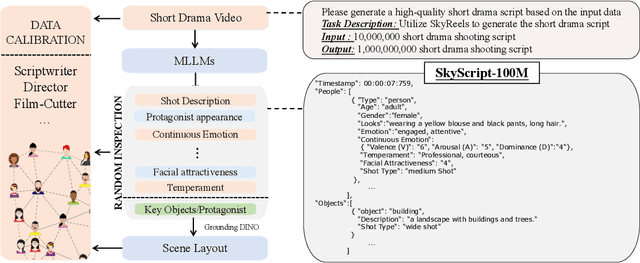
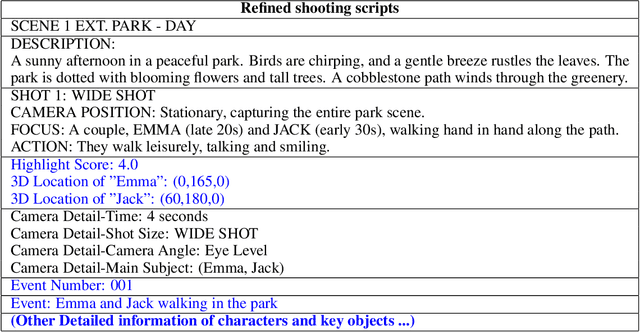
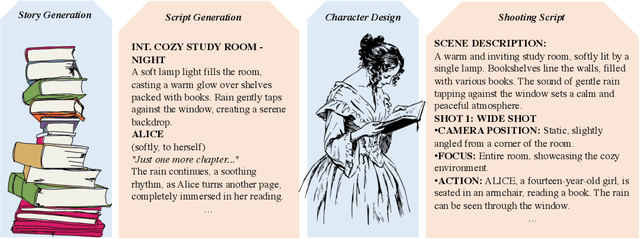
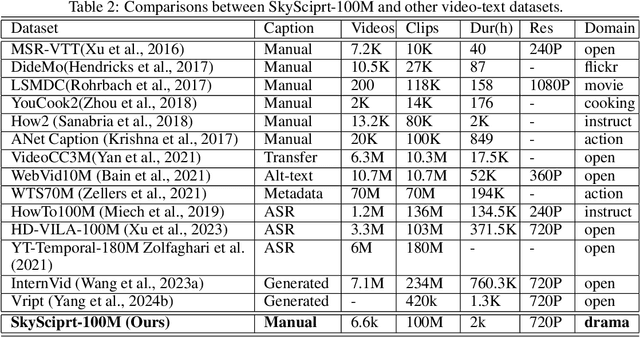
Abstract:Generating high-quality shooting scripts containing information such as scene and shot language is essential for short drama script generation. We collect 6,660 popular short drama episodes from the Internet, each with an average of 100 short episodes, and the total number of short episodes is about 80,000, with a total duration of about 2,000 hours and totaling 10 terabytes (TB). We perform keyframe extraction and annotation on each episode to obtain about 10,000,000 shooting scripts. We perform 100 script restorations on the extracted shooting scripts based on our self-developed large short drama generation model SkyReels. This leads to a dataset containing 1,000,000,000 pairs of scripts and shooting scripts for short dramas, called SkyScript-100M. We compare SkyScript-100M with the existing dataset in detail and demonstrate some deeper insights that can be achieved based on SkyScript-100M. Based on SkyScript-100M, researchers can achieve several deeper and more far-reaching script optimization goals, which may drive a paradigm shift in the entire field of text-to-video and significantly advance the field of short drama video generation. The data and code are available at https://github.com/vaew/SkyScript-100M.
Towards Playing Full MOBA Games with Deep Reinforcement Learning
Dec 31, 2020



Abstract:MOBA games, e.g., Honor of Kings, League of Legends, and Dota 2, pose grand challenges to AI systems such as multi-agent, enormous state-action space, complex action control, etc. Developing AI for playing MOBA games has raised much attention accordingly. However, existing work falls short in handling the raw game complexity caused by the explosion of agent combinations, i.e., lineups, when expanding the hero pool in case that OpenAI's Dota AI limits the play to a pool of only 17 heroes. As a result, full MOBA games without restrictions are far from being mastered by any existing AI system. In this paper, we propose a MOBA AI learning paradigm that methodologically enables playing full MOBA games with deep reinforcement learning. Specifically, we develop a combination of novel and existing learning techniques, including curriculum self-play learning, policy distillation, off-policy adaption, multi-head value estimation, and Monte-Carlo tree-search, in training and playing a large pool of heroes, meanwhile addressing the scalability issue skillfully. Tested on Honor of Kings, a popular MOBA game, we show how to build superhuman AI agents that can defeat top esports players. The superiority of our AI is demonstrated by the first large-scale performance test of MOBA AI agent in the literature.
Supervised Learning Achieves Human-Level Performance in MOBA Games: A Case Study of Honor of Kings
Nov 25, 2020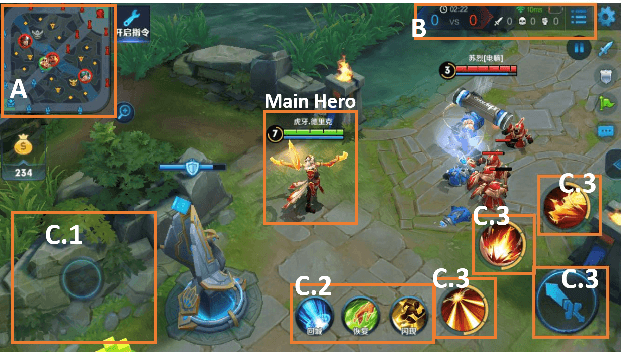
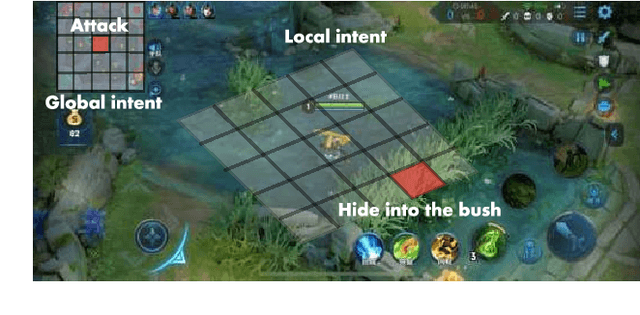

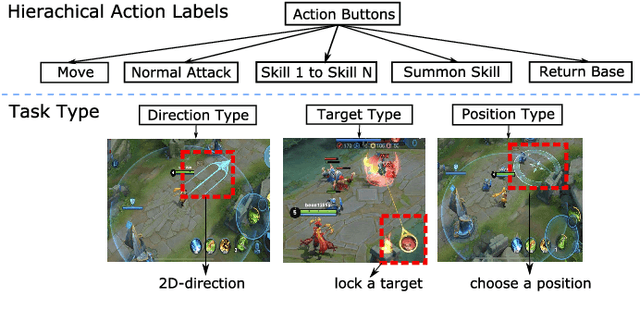
Abstract:We present JueWu-SL, the first supervised-learning-based artificial intelligence (AI) program that achieves human-level performance in playing multiplayer online battle arena (MOBA) games. Unlike prior attempts, we integrate the macro-strategy and the micromanagement of MOBA-game-playing into neural networks in a supervised and end-to-end manner. Tested on Honor of Kings, the most popular MOBA at present, our AI performs competitively at the level of High King players in standard 5v5 games.
PSF-LO: Parameterized Semantic Features Based Lidar Odometry
Oct 31, 2020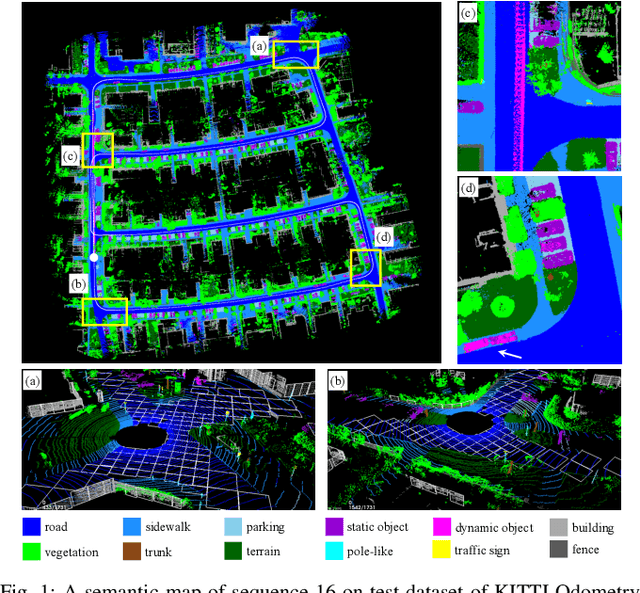
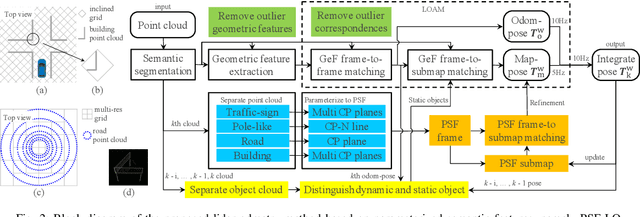
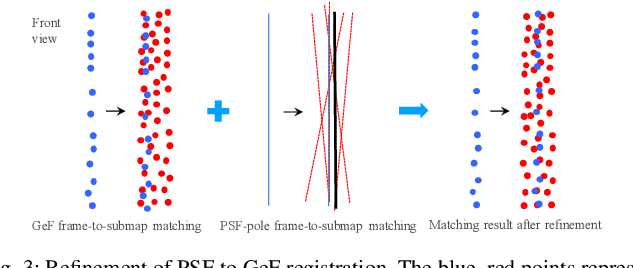
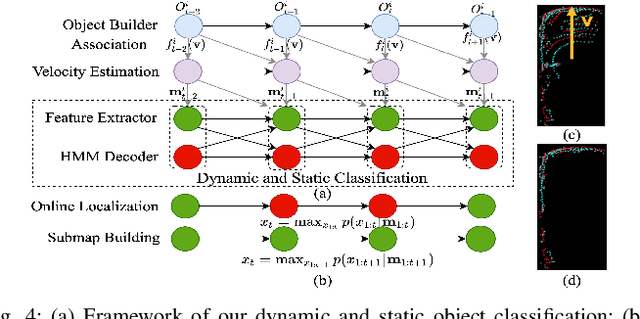
Abstract:Lidar odometry (LO) is a key technology in numerous reliable and accurate localization and mapping systems of autonomous driving. The state-of-the-art LO methods generally leverage geometric information to perform point cloud registration. Furthermore, obtaining point cloud semantic information which can describe the environment more abundantly will help for the registration. We present a novel semantic lidar odometry method based on self-designed parameterized semantic features (PSFs) to achieve low-drift ego-motion estimation for autonomous vehicle in realtime. We first use a convolutional neural network-based algorithm to obtain point-wise semantics from the input laser point cloud, and then use semantic labels to separate the road, building, traffic sign and pole-like point cloud and fit them separately to obtain corresponding PSFs. A fast PSF-based matching enable us to refine geometric features (GeFs) registration, reducing the impact of blurred submap surface on the accuracy of GeFs matching. Besides, we design an efficient method to accurately recognize and remove the dynamic objects while retaining static ones in the semantic point cloud, which are beneficial to further improve the accuracy of LO. We evaluated our method, namely PSF-LO, on the public dataset KITTI Odometry Benchmark and ranked #1 among semantic lidar methods with an average translation error of 0.82% in the test dataset at the time of writing.
 Add to Chrome
Add to Chrome Add to Firefox
Add to Firefox Add to Edge
Add to Edge